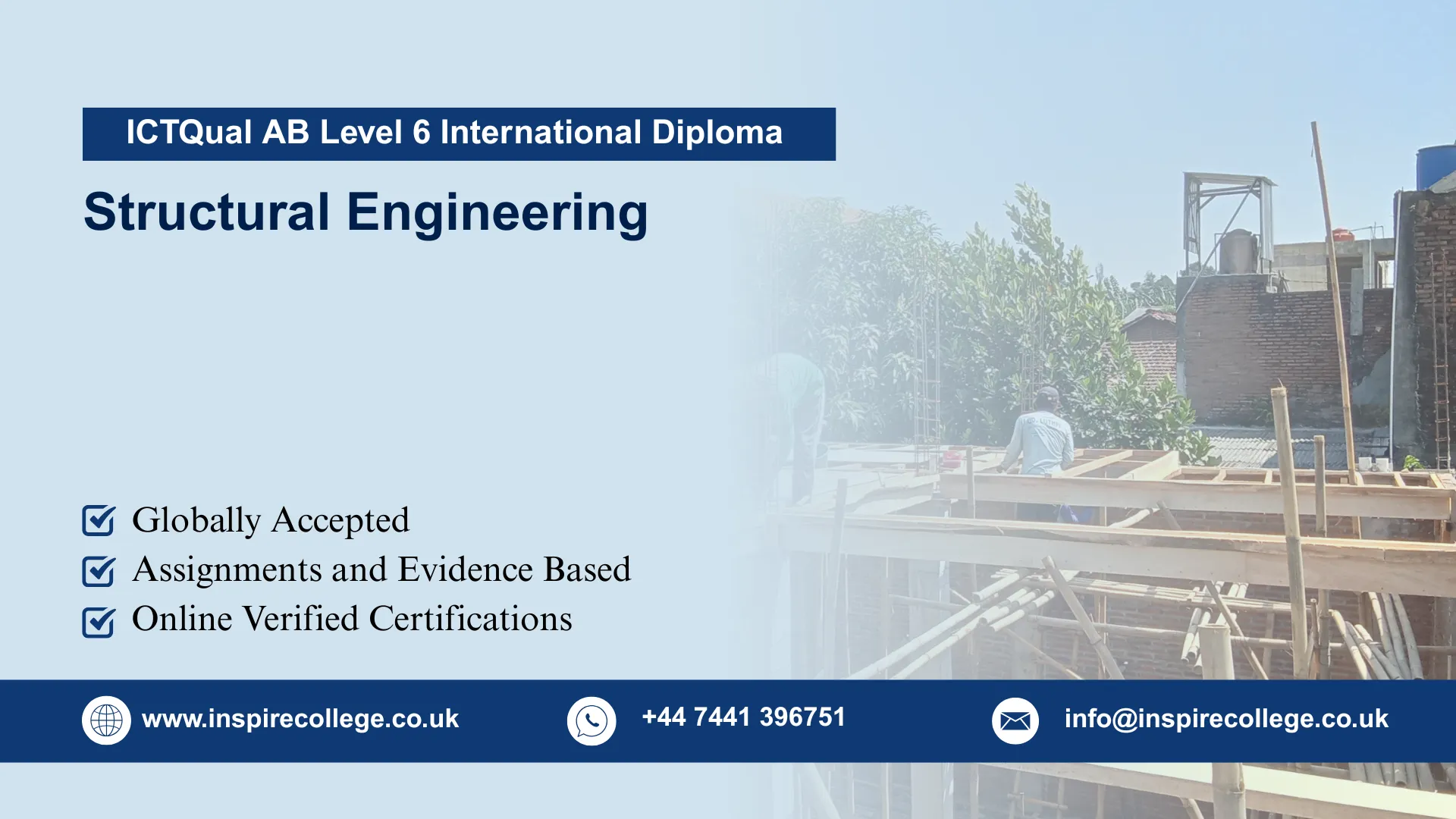
ICTQual AB Level 6 International Diploma in Structural Engineering
The ICTQual AB Level 6 International Diploma in Structural Engineering is designed to equip learners with advanced knowledge and practical expertise in the analysis, design, and construction of safe, efficient, and sustainable structures. Structural engineering plays a critical role in modern infrastructure, ensuring that buildings, bridges, and industrial facilities meet rigorous safety standards while optimizing performance and durability.
This comprehensive three-year, 360-credit programme provides learners with a robust foundation in engineering principles, structural mechanics, materials science, and construction technologies. It is tailored for both fresh graduates seeking to launch their careers in civil and structural engineering and professionals aiming to enhance their technical skills and advance into leadership or specialised engineering roles.
Learners will develop proficiency in structural analysis, finite element modelling, seismic design, and load-bearing calculations, alongside project management, construction planning, and quality assurance. The programme emphasizes practical application through case studies, simulations, and research-driven projects, ensuring graduates can translate theoretical knowledge into real-world engineering solutions.
Upon completion, learners will gain internationally recognised qualifications, enabling them to pursue careers in civil and structural engineering firms, construction companies, consultancy practices, and infrastructure development agencies worldwide. This diploma also serves as a strong foundation for further postgraduate studies or professional certifications in structural engineering, construction management, or related disciplines.
By combining rigorous academic training with hands-on practical experience, the ICTQual AB Level 6 International Diploma in Structural Engineering prepares graduates to excel in the global engineering industry and contribute effectively to the development of safe, innovative, and sustainable structures.
The ICTQual AB Level 6 International Diploma in Structural Engineering is designed for learners aiming to build a strong foundation in civil and structural engineering or advance their existing expertise. To ensure learners are well-prepared for this comprehensive programme, the following entry requirements apply:
Age Requirements
- Learners must be at least 18 years of age at the time of enrolment.
Educational Requirements
- Completion of secondary education (high school diploma or equivalent) with a focus on mathematics, physics, or engineering-related subjects.
- Alternatively, a relevant Level 5 diploma or certificate in civil engineering, construction, or a related technical field.
Professional Experience
- Experienced Professionals: Individuals with at least 3–5 years of verifiable work experience in civil or structural engineering, construction, or related sectors may be considered for advanced entry.
- Fresh Learners: Recent graduates or those with minimal professional experience are welcome and will follow the full 3-year curriculum.
English Language Proficiency
- Learners must demonstrate proficiency in English.
- Acceptable evidence includes IELTS 5.5 or equivalent, or completion of prior education in English.
Meeting these entry requirements ensures learners are fully prepared to engage with the technical, analytical, and practical components of the Structural Engineering diploma.By enrolling through our approved ICTQual AB centre, learners receive comprehensive support, access to study materials, and guidance throughout their three-year journey, setting the stage for successful careers in civil and structural engineering worldwide.
Mandatory Units
This qualification, the ICTQual AB Level 6 International Diploma in Structural Engineering360 Credits – Three Years, consists of 36 mandatory units.
Year 1 – Foundation in Structural Engineering
- Principles of Civil and Structural Engineering
- Engineering Mathematics
- Engineering Mechanics and Materials
- Structural Analysis – Fundamentals
- Engineering Drawing and CAD
- Construction Materials and Technology
- Surveying and Geomatics
- Soil Mechanics and Geotechnics – Basics
- Fluid Mechanics and Hydraulics
- Health, Safety and Environmental Practices in Construction
- Communication and Technical Report Writing
- Introduction to Construction Management
Year 2 – Intermediate Studies in Structural Engineering
- Structural Analysis – Intermediate Applications
- Steel and Concrete Structural Design
- Geotechnical Engineering and Foundation Design
- Applied Hydraulics and Hydrology
- Transportation and Highway Engineering
- Structural Dynamics and Earthquake Engineering – Basics
- Environmental Engineering in Construction
- Advanced Surveying and GIS Applications
- Project Planning and Construction Management
- Construction Economics and Cost Control
- Sustainable Construction Practices
- Applied Research Methods in Engineering
Year 3 – Advanced Studies in Structural Engineering
- Advanced Structural Analysis and Modelling
- Design of High-Rise and Complex Structures
- Bridge Engineering and Design
- Structural Dynamics and Earthquake Engineering – Advanced
- Advanced Geotechnical Engineering
- Construction Project Risk and Quality Management
- Building Information Modelling (BIM) and Digital Engineering
- Smart Materials and Innovative Construction Technologies
- Professional Ethics and Sustainability in Engineering
- Innovation and Entrepreneurship in Engineering
- Infrastructure Development and Urban Planning
- Final Year Major Project (Capstone Project)
The ICTQual AB Level 6 International Diploma in Structural Engineering equips learners with advanced technical knowledge, practical skills, and professional competencies required for a successful career in civil and structural engineering. Upon completion, learners will be able to apply engineering principles, analyse complex structures, and contribute to innovative and sustainable construction projects.
Year 1 – Foundation in Structural Engineering
Principles of Civil and Structural Engineering
- Understand fundamental concepts of civil and structural engineering.
- Apply engineering principles to basic structural problem-solving.
- Recognise key engineering standards and practices in construction projects.
Engineering Mathematics
- Solve complex engineering problems using advanced mathematical techniques.
- Apply calculus, algebra, and statistics to structural analysis.
- Develop precise modelling and calculation skills for engineering applications.
Engineering Mechanics and Materials
- Analyse forces, moments, and stresses in structural components.
- Select appropriate construction materials based on mechanical properties.
- Demonstrate understanding of material behaviour under various loads.
Structural Analysis – Fundamentals
- Apply basic structural analysis techniques to beams, frames, and trusses.
- Evaluate load distribution and reactions in simple structures.
- Interpret analysis results to inform preliminary design decisions.
Engineering Drawing and CAD
- Produce accurate engineering drawings and technical schematics.
- Utilise CAD software for modelling structural components.
- Translate design concepts into clear visual representations.
Construction Materials and Technology
- Identify properties of concrete, steel, timber, and composite materials.
- Apply construction technologies to structural design and execution.
- Evaluate material suitability for specific projects.
Surveying and Geomatics
- Conduct basic surveying and site measurement techniques.
- Apply geomatic tools to mapping and layout of construction sites.
- Interpret survey data for planning and design applications.
Soil Mechanics and Geotechnics – Basics
- Understand soil properties and their impact on structural foundations.
- Perform basic soil testing and analysis.
- Apply geotechnical principles to foundation design.
Fluid Mechanics and Hydraulics
- Analyse fluid behaviour in civil engineering systems.
- Apply hydraulic principles to water supply and drainage design.
- Solve basic fluid mechanics problems in construction projects.
Health, Safety and Environmental Practices in Construction
- Identify key health, safety, and environmental regulations.
- Implement safe working practices on construction sites.
- Evaluate environmental impact of engineering projects.
Communication and Technical Report Writing
- Develop professional communication and technical writing skills.
- Prepare reports, proposals, and documentation for engineering projects.
- Present technical information effectively to diverse audiences.
Introduction to Construction Management
- Understand project lifecycle, planning, and management fundamentals.
- Apply basic management principles to construction workflows.
- Collaborate effectively in project teams and meetings.
Year 2 – Intermediate Studies in Structural Engineering
Structural Analysis – Intermediate Applications
- Analyse statically indeterminate structures.
- Apply computational methods to structural problem-solving.
- Interpret analysis results for design decision-making.
Steel and Concrete Structural Design
- Design reinforced concrete and steel elements following international codes.
- Calculate load-bearing capacities and structural stability.
- Integrate design principles with safety and sustainability standards.
Geotechnical Engineering and Foundation Design
- Design shallow and deep foundations based on soil characteristics.
- Apply geotechnical investigation data in structural planning.
- Evaluate foundation performance under varied loading conditions.
Applied Hydraulics and Hydrology
- Analyse hydrological data for engineering applications.
- Design basic hydraulic systems and drainage networks.
- Apply hydrological principles to infrastructure planning.
Transportation and Highway Engineering
- Understand principles of highway design and traffic engineering.
- Analyse transportation systems for efficiency and safety.
- Apply sustainable design concepts in roadway projects.
Structural Dynamics and Earthquake Engineering – Basics
- Understand dynamic loading and seismic forces on structures.
- Analyse simple dynamic systems under earthquake conditions.
- Apply basic earthquake-resistant design principles.
Environmental Engineering in Construction
- Assess environmental impacts of construction projects.
- Implement sustainable construction practices.
- Ensure compliance with environmental regulations.
Advanced Surveying and GIS Applications
- Apply advanced surveying techniques and GIS in construction projects.
- Analyse spatial data for site planning and design.
- Utilise geospatial tools for project management.
Project Planning and Construction Management
- Develop detailed project plans and schedules.
- Apply construction management techniques to real projects.
- Monitor project progress and resource allocation effectively.
Construction Economics and Cost Control
- Evaluate project costs and budgeting requirements.
- Apply financial analysis for construction decision-making.
- Implement cost-control measures in construction projects.
Sustainable Construction Practices
- Integrate sustainable materials and techniques in project design.
- Evaluate energy-efficient and eco-friendly solutions.
- Promote environmental responsibility in engineering projects.
Applied Research Methods in Engineering
- Conduct engineering research following scientific methods.
- Analyse and interpret technical data for project solutions.
- Apply research outcomes to design and construction challenges.
Year 3 – Advanced Studies in Structural Engineering
Advanced Structural Analysis and Modelling
- Perform complex structural modelling using software tools.
- Analyse high-rise, long-span, and complex structures.
- Apply modelling results to design optimisation and safety assessment.
Design of High-Rise and Complex Structures
- Design multi-storey buildings and large-scale infrastructures.
- Integrate structural safety, functionality, and aesthetics.
- Apply international codes and standards for advanced design.
Bridge Engineering and Design
- Design bridges considering structural, environmental, and load factors.
- Analyse bridge components under static and dynamic loads.
- Apply maintenance and inspection principles in bridge engineering.
Structural Dynamics and Earthquake Engineering – Advanced
- Analyse dynamic response of structures under seismic events.
- Design earthquake-resistant systems for buildings and infrastructure.
- Evaluate mitigation strategies for disaster resilience.
Advanced Geotechnical Engineering
- Solve complex soil-structure interaction problems.
- Design foundations and retaining systems for challenging sites.
- Apply geotechnical investigations to real-world construction projects.
Construction Project Risk and Quality Management
- Identify and manage project risks effectively.
- Implement quality control and assurance practices.
- Develop risk mitigation strategies for complex projects.
Building Information Modelling (BIM) and Digital Engineering
- Utilise BIM for integrated project planning and execution.
- Apply digital tools for construction simulation and analysis.
- Enhance collaboration and efficiency through digital engineering.
Smart Materials and Innovative Construction Technologies
- Evaluate advanced construction materials for performance and sustainability.
- Apply innovative technologies in structural engineering projects.
- Integrate emerging materials and techniques into design solutions.
Professional Ethics and Sustainability in Engineering
- Apply ethical principles in engineering practice.
- Promote sustainable and responsible project management.
- Evaluate social, economic, and environmental impacts of engineering decisions.
Innovation and Entrepreneurship in Engineering
- Develop innovative solutions to engineering challenges.
- Explore entrepreneurial opportunities in construction and infrastructure.
- Apply business and management concepts to engineering projects.
Infrastructure Development and Urban Planning
- Understand urban planning principles and their integration with structural engineering.
- Design infrastructure considering functionality, sustainability, and urban growth.
- Evaluate socio-economic and environmental impacts of urban development projects.
Final Year Major Project (Capstone Project)
- Apply comprehensive knowledge and skills to a real-world project.
- Conduct advanced structural analysis, design, and management tasks.
- Demonstrate competence in technical reporting, problem-solving, and project execution.
Completing the ICTQual AB Level 6 International Diploma in Structural Engineering equips learners with advanced theoretical knowledge, practical skills, and professional competence to excel in civil and structural engineering careers worldwide. Graduates are prepared to contribute to complex construction projects, innovative designs, and sustainable infrastructure development.
The ICTQual AB Level 6 International Diploma in Structural Engineering is designed for motivated individuals seeking to advance their careers in civil and structural engineering. This programme is suitable for learners from diverse educational and professional backgrounds who aim to develop advanced technical expertise, practical skills, and international recognition in the engineering sector.
1. Fresh School Leavers
- Learners who have recently completed secondary education and aspire to start a career in structural or civil engineering.
- Provides a solid foundation in engineering principles, mathematics, and construction technology.
- Prepares learners for entry-level roles in construction, infrastructure development, and design projects.
2. Aspiring Engineers
- Individuals aiming to enter the engineering sector with a focus on structural analysis, design, and project management.
- Offers skills in CAD, BIM, material science, and construction management.
- Opens pathways to roles in engineering consultancy, design offices, and construction companies.
3. Current Engineering Practitioners
- Civil, mechanical, or structural technicians, site engineers, or construction supervisors looking to upskill.
- Supports career advancement into project management, design leadership, or specialized engineering roles.
- Enhances technical competence and professional credibility in engineering projects.
4. International Learners
- Students worldwide seeking a globally relevant qualification in structural engineering.
- Builds cross-cultural understanding and prepares learners for diverse engineering environments.
- Equips learners to work on international construction, infrastructure, and consultancy projects.
5. Career Changers
- Professionals from non-engineering fields aiming to transition into structural or civil engineering.
- Provides a structured pathway to acquire engineering knowledge, technical skills, and practical experience.
- Opens opportunities in high-demand construction and infrastructure sectors.
This programme is ideal for learners who want to gain advanced structural engineering knowledge, develop practical skills, and achieve international recognition in the civil and structural engineering industry. By completing this diploma, learners are equipped to excel in technical, managerial, and innovative roles within engineering and construction sectors.
As an approved ICTQual AB centre, we offer learners the opportunity to enrol in the ICTQual AB Level 6 International Diploma in Structural Engineering through structured certification routes designed for both experienced professionals and fresh learners.
1. Certification Route for Experienced Professionals
- Designed for learners with at least 6 years of verifiable experience in civil, structural, or construction engineering roles.
- Professionals can fast-track their certification by submitting a portfolio demonstrating relevant skills, achievements, and expertise.
- Prior practical experience is assessed to ensure it aligns with the standards of the Level 6 diploma.
- Upon successful verification, learners are awarded the ICTQual AB Level 6 International Diploma without completing the full set of assignments, recognising their professional competence and experience.
2. Certification Route for Fresh Learners
- Suitable for recent graduates or individuals with limited professional experience in engineering or construction.
- Learners are required to complete all 36 assignments covering theoretical knowledge, practical applications, design, and project management.
- Assignments are structured to develop skills in structural analysis, CAD/BIM, materials science, construction technology, and project planning.
- Successful completion of all assignments leads to the award of the ICTQual AB Level 6 International Diploma, ensuring mastery of programme content and practical competencies.
Enrolment is available directly through our approved ICTQual AB centre, providing learners with full support, access to study materials, and guidance throughout their learning journey. Whether you are an experienced professional seeking recognition for your expertise or a fresh learner aiming to build a strong foundation, our certification routes offer a globally recognised pathway to success in structural engineering.
Register Now
FAQs for ICTQual AB Level 6 International Diploma in Structural Engineering






